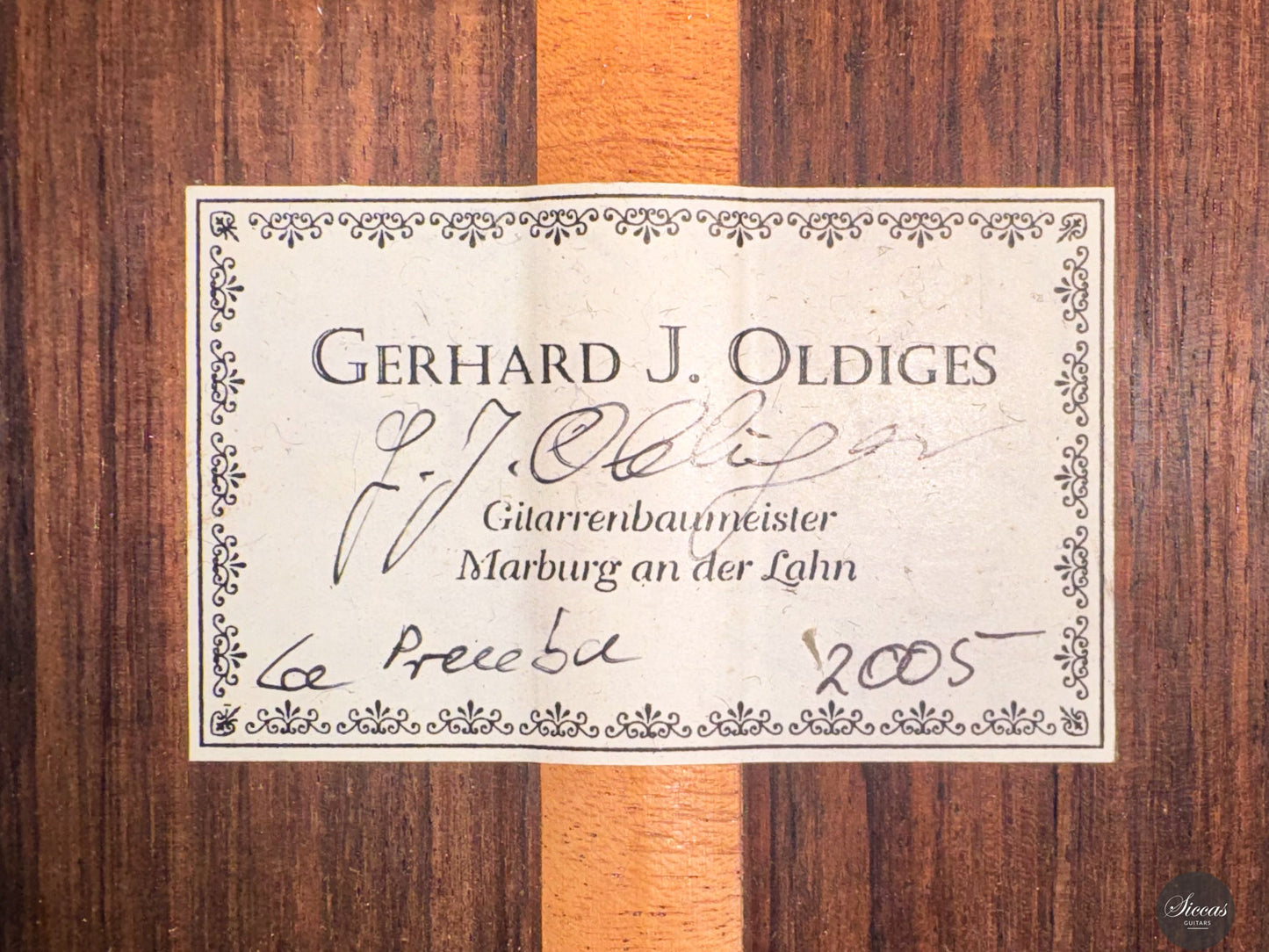Gerhard Oldiges - 2005 - La Prueba
Gerhard Oldiges - 2005 - La Prueba
Details
Details
Overview
Overview
Shipping important note
Shipping important note
Important: Additional costs such as import taxes and custom duties may occur when importing goods from the EU into your country.
Delivery times are typically reliable and most instruments arrive within the estimated timeframe.
Should any unexpected delay occur, our team will keep you informed and provide support at every step. For all shipping details and exceptions, please see our Shipping Policy.
Details about GPSR
Details about GPSR
























Video overview


More details about the guitar
About the luthier
Gerhard Oldiges is a German luthier renowned for his precision craftsmanship and deep understanding of traditional Spanish guitar-making methods. His guitars are characterized by their refined tonal balance, visual elegance and structural integrity. Drawing inspiration from historical models, Oldiges crafts instruments that appeal to both professional musicians and collectors who value a classic sound character realized through modern lutherie.About the guitar
The 2005 guitar “La Prueba” by Gerhard Oldiges is a masterful creation that showcases exceptional artistry and meticulous craftsmanship. This instrument features a beautiful spruce top and fine-grained Indian rosewood for the back and sides, materials chosen for their rich tonal qualities and aesthetic appeal. The guitar is adorned with elegant marquetry, adding a touch of classic elegance to its design. “La Prueba” delivers a breathtaking auditory experience. The guitar produces a rich and balanced tonal palette, characterized by deep, silky basses and brilliant trebles that complement each other perfectly. The instrument’s excellent playability and tonal strength make it a true gem, combining modern features with an old-world sound character.Condition
Despite being a pre-loved instrument, “La Prueba” remains in impeccable condition, maintaining its superior sound quality and visual allure.Regular care extends the life of the instrument
Even with careful use, a classical guitar may gradually change in appearance or respond to unstable storage conditions. Have a close look at your guitar regularly and be attentif to changes. If your instrument is suffering from its environement, it will let you know.
Protect Your Guitar: Handle with Care
Be mindful when touching your instrument with greasy or unwashed hands: any skin contact is a small attack on the varnish. Of course, a guitar is made to be played, but taking a few precautions helps preserve its beauty: wash your hands before playing, wear long sleeves, and avoid unnecessary direct skin contact with the body of the instrument.
Pro tip: Avoid playing with a button-up shirt, heavy jewelry, or a belt, as these can scratch the guitar. Also, make sure your guitar case is free of any objects that could damage the instrument during storage.
String care
A good habit to adopt is wiping down your strings briefly after each playing session. This small action significantly extends their lifespan and helps maintain a consistent, comfortable feel under your fingers.
Most importantly, clean strings are essential for keeping your instrument in tune. Corrosion, sweat, and dust can affect the uniformity of the strings and interfere with accurate tuning across the entire fingerboard.
Pro tip: If you're having trouble getting your guitar in tune, it might be time to change the strings. A useful test is to compare the pitch of the 12th fret harmonic with the fretted note at the 12th fret; if there's an unusually large gap between them, your strings may have lost their integrity and should be replaced.
Keep Your Shellac Finish Shining!
Got a guitar with a shellac (French polish) finish? Here's a simple trick: Take a clean microfiber cloth and gently breathe on the surface to create a light mist. Then, softly rub to remove fingerprints, sweat, and grease. That’s usually all it takes to keep it looking great, no products needed!
Pro tip: Every few years, treat your guitar to a check-up with a luthier to keep it in top shape.
Storing Your Guitar: Climate Matters
Your guitar can safely stay outside its case, as long as the surrounding environment maintains 42–55% humidity and a temperature between 18–25°C.
Keep in mind that humidity levels can still fluctuate inside the case, especially during seasonal changes.
- Too much humidity may cause overtightened strings and a dull tone.
- Too little humidity can lead to a bulging top, string buzz, or even cracks.
Avoid placing your guitar near radiators, air conditioners, or windows with direct sunlight.
Pro tip: Always close your guitar case while playing. This helps preserve a stable microclimate inside the case, so your instrument is protected the moment you put it back in.



















































